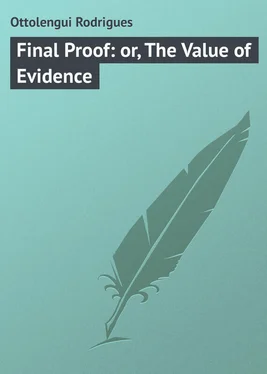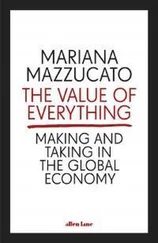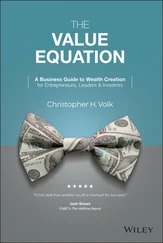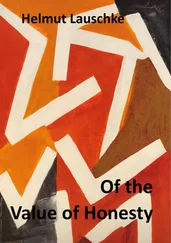Rodrigues Ottolengui - Final Proof - or, The Value of Evidence
Здесь есть возможность читать онлайн «Rodrigues Ottolengui - Final Proof - or, The Value of Evidence» — ознакомительный отрывок электронной книги совершенно бесплатно, а после прочтения отрывка купить полную версию. В некоторых случаях можно слушать аудио, скачать через торрент в формате fb2 и присутствует краткое содержание. Жанр: foreign_prose, на английском языке. Описание произведения, (предисловие) а так же отзывы посетителей доступны на портале библиотеки ЛибКат.
- Название:Final Proof: or, The Value of Evidence
- Автор:
- Жанр:
- Год:неизвестен
- ISBN:нет данных
- Рейтинг книги:3 / 5. Голосов: 1
-
Избранное:Добавить в избранное
- Отзывы:
-
Ваша оценка:
- 60
- 1
- 2
- 3
- 4
- 5
Final Proof: or, The Value of Evidence: краткое содержание, описание и аннотация
Предлагаем к чтению аннотацию, описание, краткое содержание или предисловие (зависит от того, что написал сам автор книги «Final Proof: or, The Value of Evidence»). Если вы не нашли необходимую информацию о книге — напишите в комментариях, мы постараемся отыскать её.
Final Proof: or, The Value of Evidence — читать онлайн ознакомительный отрывок
Ниже представлен текст книги, разбитый по страницам. Система сохранения места последней прочитанной страницы, позволяет с удобством читать онлайн бесплатно книгу «Final Proof: or, The Value of Evidence», без необходимости каждый раз заново искать на чём Вы остановились. Поставьте закладку, и сможете в любой момент перейти на страницу, на которой закончили чтение.
Интервал:
Закладка:
"Yes, sir. That's what surprised me. He had all his clothes on."
"Did he awaken his brother?"
"No. He just looked at him, and then tiptoed out and went upstairs. I slipped behind the hall door, so that he would not see me."
"Was the lamp in his hand one that he had brought down from his own room?"
"No, sir. It was one that I had been ordered to put in the room where the coffin was, as they did not want the electric light turned on in there all night. Mr. Amos went back into the front room, and left the lamp there before he went upstairs."
"Do you know when Mr. Mark went up to his room? Did he remain downstairs all night?"
"No, sir. He was in bed in his own room when I came around in the morning. About six o'clock, that was. But I don't know when he went to bed. He did not come down to breakfast, though, till nearly noon. The funeral was at two o'clock."
"That is all, I think," said Mr. Barnes. "But do not let any one know that I have talked with you."
"Just as you say, sir."
As it was now nearing noon, Mr. Barnes left the house and hastened up to Mr. Mitchel's residence to keep his engagement for luncheon. Arrived there, he was surprised to have Williams inform him that he had received a telephone message to the effect that Mr. Mitchel would not be at home for luncheon.
"But, Inspector," said Williams, "here's a note just left for you by a messenger."
Mr. Barnes took the envelope, which he found inclosed the following from Mr. Mitchel:
"Friend Barnes: —
"Am sorry I cannot be home to luncheon. Williams will give you a bite. I have news for you. I have seen the ashes, and there is now no doubt that a body, a human body, was burned at the crematory that day. I do not despair that we may yet discover whose body it was. More when I know more."
Mr. Barnes read this note over two or three times, and then folded it thoughtfully and put it in his pocket. He found it difficult to decide whether Mr. Mitchel had been really detained, or whether he had purposely broken his appointment. If the latter, then Mr. Barnes felt sure that already he had made some discovery which rendered this case doubly attractive to him, so much so that he had concluded to seek the solution himself.
"That man is a monomaniac," thought Mr. Barnes, somewhat nettled. "I come here and attract his attention to a case that I know will afford him an opportunity to follow a fad, and now he goes off and is working the case alone. It is not fair. But I suppose this is another challenge, and I must work rapidly to get at the truth ahead of him. Well, I will accept, and fight it out."
Thus musing, Mr. Barnes, who had declined Williams's offer to serve luncheon, left the house and proceeded to the shop of the undertaker. This man had a name the full significance of which had never come home to him until he began the business of caring for the dead. He spelled it Berial, and insisted that the pronunciation demanded a long sound to the "i," and a strong accent on the middle syllable. But he was constantly annoyed by the cheap wit of acquaintances, who with a significant titter would call him either Mr. "Burial," or Mr. "Bury all."
Mr. Barnes found Mr. Berial disengaged, undertakers, fortunately, not always being rushed with business, and encountered no difficulty in approaching his subject.
"I have called, Mr. Berial," said the detective, "to get a little information about your management of the funeral of Mr. Quadrant."
"Certainly," said Mr. Berial; "any information I can give, you are welcome to. Detective, I suppose?"
"Yes; in the interest of the family," replied Mr. Barnes. "There are some odd features of this case, Mr. Berial."
"Odd?" said the undertaker. "Odd don't half cover it. It's the most remarkable thing in the history of the world. Here I am, with an experience in funerals covering thirty years, and I go and have a man decently cremated, and, by hickory, if he ain't found floating in the river the next morning. Odd? Why, there ain't any word to describe a thing like that. It's devilish; that's the nearest I can come to it."
"Well, hardly that," said Mr. Barnes, with a smile. "Of course, since Mr. Quadrant's body has been found in the river, it never was cremated."
"Who says so?" asked the undertaker, sharply. "Not cremated? Want to bet on that? I suppose not. We can't make a bet about the dead. It wouldn't be professional. But Mr. Quadrant was cremated. There isn't any question about that point. Put that down as final."
"But it is impossible that he should have been cremated, and then reappear at the Morgue."
"Just what I say. The thing's devilish. There's a hitch, of course. But why should it be at my end, eh? Tell me that, will you? There's just as much chance for a mistake at the Morgue as at the funeral, isn't there?" This was said in a tone that challenged dispute.
"What mistake could have occurred at the Morgue?" asked Mr. Barnes.
"Mistaken identification," replied the undertaker so quickly that he had evidently anticipated the question. "Mistaken identification. That's your cue, Mr. Barnes. It's happened often enough before," he added, with a chuckle.
"I scarcely think there can be a mistake of that character," said Mr. Barnes, thinking, nevertheless, of the scar on the foot. "This identification is not merely one of recognition; it is supported by scientific reason, advanced by the doctors."
"Oh! doctors make mistakes too, I guess," said Mr. Berial, testily. "Look here, you're a detective. You're accustomed to weigh evidence. Now tell me, will you, how could this man be cremated, as I tell you he was, and then turn up in the river? Answer that, and I'll argue with you."
"The question, of course, turns on the fact of the cremation. How do you know that the body was in the coffin when it was consigned to the furnace?"
"How do I know? Why, ain't that my business? Who should know if I don't? Didn't I put the body in the coffin myself?"
"Very true. But why could not some one have taken the body out after you closed the coffin finally, and before the hour of the funeral?"
Mr. Berial laughed softly to himself, as though enjoying a joke too good to be shared too soon with another. Presently he said:
"That's a proper question, of course; a very proper question, and I'll answer it. But I must tell you a secret, so you may understand it. You see in this business we depend a good deal on the recommendation of the attending physician. Some doctors are real professional, and recommend a man on his merits. Others are different. They expect a commission. Surprises you, don't it? But it's done every day in this town. The doctor can't save his patient, and the patient dies. Then he tells the sorrowing friends that such and such an undertaker is the proper party to hide away the result of his failure; failure to cure, of course. In due time he gets his little check, ten per cent. of the funeral bill. This seems like wandering away from the point, but I am coming back to it. This commission arrangement naturally keeps me on the books of certain doctors, and vicy versy it keeps them on mine. So, working for certain doctors, it follows that I work for a certain set of people. Now I've a Catholic doctor on my books, and it happens that the cemetery where that church buries is in a lonesome place; just the spot for a grave-robber to work undisturbed, especially if the watchman out there should happen to be fond of his tipple, which I tell you, again in confidence, that he is. Now, then, it has happened more than once, though it has been kept quiet, that a grave filled up one afternoon would be empty the next morning. At least the body would be gone. Of course they wouldn't take the coffin, as they'd be likely to be caught getting rid of it. You see, a coffin ain't exactly regular household furniture. If they have time they fill the grave again, but often enough they're too anxious to get away, because, of course, the watchman might not be drunk. Well, these things being kept secret, but still pretty well known in the congregation, told in whispers, I might say, a sort of demand sprung up for a style of coffin that a grave-robber couldn't open, – a sort of coffin with a combination lock, as it were."
Читать дальшеИнтервал:
Закладка:
Похожие книги на «Final Proof: or, The Value of Evidence»
Представляем Вашему вниманию похожие книги на «Final Proof: or, The Value of Evidence» списком для выбора. Мы отобрали схожую по названию и смыслу литературу в надежде предоставить читателям больше вариантов отыскать новые, интересные, ещё непрочитанные произведения.
Обсуждение, отзывы о книге «Final Proof: or, The Value of Evidence» и просто собственные мнения читателей. Оставьте ваши комментарии, напишите, что Вы думаете о произведении, его смысле или главных героях. Укажите что конкретно понравилось, а что нет, и почему Вы так считаете.












